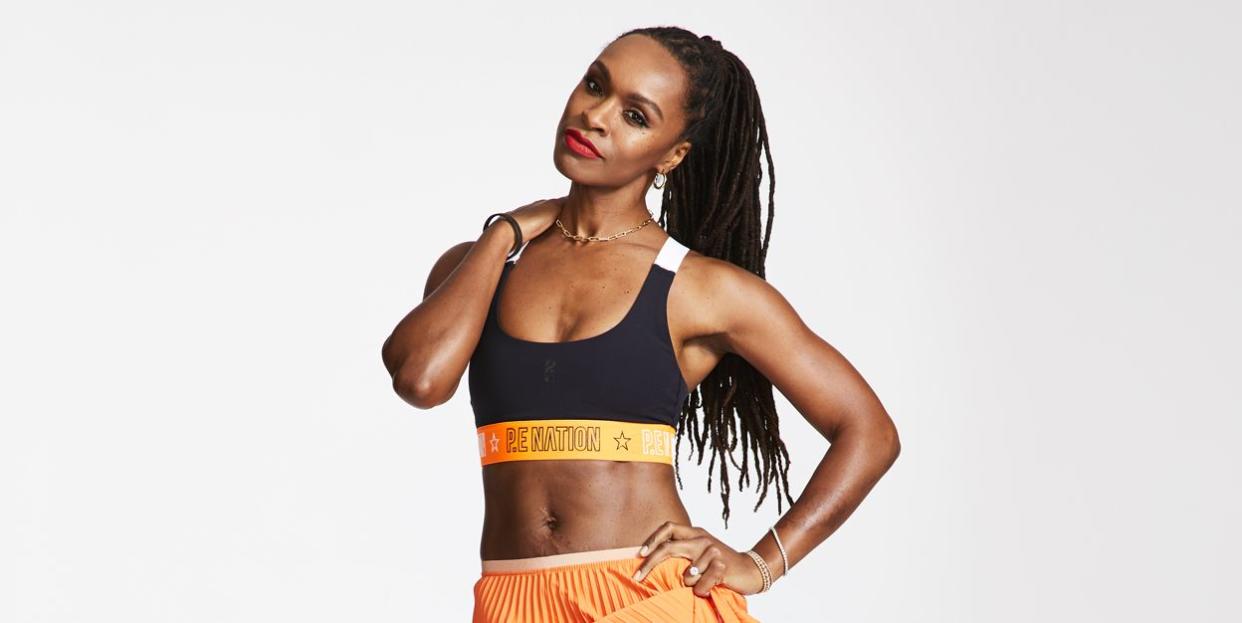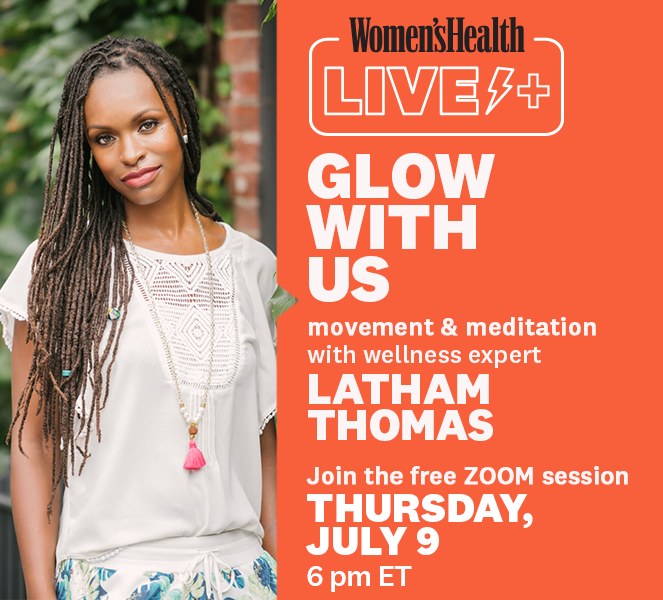Latham Thomas: ‘Black Lives Need To Start Mattering At Birth—Not Just When We’re Murdered’

Latham Thomas likes to start every day with a meditation practice she calls vocal toning. She plays a note on a small instrument called a shruti box, then hums with it a few times.
“Instead of humming in a harmony or melody, it’s just one singular tone that's kind of aligned with the sound of your speaking voice,” she explains. “I like to think about it like an internal massage that I'm giving myself in the morning. The Vagus nerve is activated, and then that sort of wraps around every single organ in the body. That allows for this feeling of—I call it ‘attunements,’ like I'm tuning myself.”
The ritual, which Latham engages in for 10 to 15 minutes every morning, is meant to set her day on a purposeful path—but it also serves as a reminder to the doula, founder, and author that she has a voice.

“This period for women is not about us being silent,” she says. “We”re in a place where our voices are really needed. And so for me, [vocal toning] is a reminder of how I can be an advocate for someone, how I can advocate for myself and support my needs, but also how I can speak to injustice, or things that are happening around me.”
And as a Black woman, a Black mother, and a doula who both works with mothers and trains a network of other doulas through her company Mama Glow, Latham has plenty to say.
“I am glad that people are rallying world-wide in support of the injustices Black people face and specifically around the horrifying state violence we have seen displayed,” she wrote in an Instagram caption on June 3 following the murders of George Floyd, Ahmaud Arbery, and Breyonna Taylor. “What I want to remind people is that your support, your concern, your allyship, should not begin when we are murdered.”
A post shared by Latham Thomas (@glowmaven) on Jun 3, 2020 at 5:49am PDT
Rather, she says, attention needs to be paid to ending systemic racism throughout all of Black people’s lives—as well as in their safety in birth. And given Latham’s line of work, that last piece is a topic that’s particularly important to her.
Join Latham Thomas for yoga and a meditation, followed by a Q&A. Register for her FREE WH Live+ event on Thursday, July 9, at 6 p.m. EST / 3 p.m. PST. See you there!
Black women in the U.S. are 3.2 times more likely than white women to die because of complications related to giving birth, according to 2019 data from the CDC. This makes childbirth more deadly for Black mothers than it is for any other racial or ethnic group in the U.S., and that disparity only increases for women over the age of 30. Controlling for socioeconomic status doesn’t eliminate the risk that motherhood poses for Black mothers, either. In fact, when the CDC looked at Black women with at least a college degree, they were 5.2 more times more likely than their white counterparts to die of causes related to childbirth.
Even more alarming: CDC data suggests that more than 60 percent of pregnancy-related deaths are preventable.
“There are systemic inequities that lead to such disparities,” Latham says in an Instagram caption from when she took over actress and wellness mogul Gwyneth Paltrow’s account on June 11 as part of the #ShareTheMic initiative. “Poor access to adequate health care and insurance, medical racism, food deserts, red-lining and lack of intra-community resources, lack of generational economic mobility.”
A post shared by Gwyneth Paltrow (@gwynethpaltrow) on Jun 10, 2020 at 4:09pm PDT
In Latham’s work training doulas—she’s worked with hundreds of women since 2018, and currently offers virtual workshops and programming—“activism and advocacy” are at the center. She incorporates statistical data about the gap in medical care faced by Black women, but she puts a face to the numbers by inviting guest speakers. This spring, for example, a Black man who’s partner died during childbirth openly shared their experience with all of the doula trainees.
“Story-telling is important, it sparks something deep inside,” says Latham. “For my students, hearing these stories makes it feel visceral.” Armed with the numbers—and the heartbreak behind them—Mama Glow’s doulas are empowered to step in if they see a mother’s care going awry. And they become uniquely qualified to educate women on how they can advocate for themselves. All of which can help improve outcomes for Black mothers.
Disparities in care affect far more than just the maternal mortality rate, though.
In fact, Latham has supported hundreds women of various ethnicities and backgrounds through their births in the 15 years she’s been a doula. And during that time, she’s witnessed microaggressions in the delivery room quite often. “I’ve seen Black couples subjected to jokes about having babies back to back, implying that we’re always having babies and are hypersexual,” she says.
She’s also witnessed partners asked to leave delivery rooms (something doctors and administrators are allowed to do) because the father is deemed “aggressive” by hospital staff, particularly if the father has tattoos, is bigger in build, or has been “noncompliant” by speaking up for their partner’s needs.
“One dad, who is a friend, dressed in a suit so that he could be taken seriously and not be seen as a threat,” Latham says.
Research also shows that “the pain of Black Americans is systematically underdiagnosed and undertreated, compared to the pain of their White counterparts.” One study published in the journal Psychological and Cognitive Sciences even found that half of white medical students and residents surveyed by researchers had false beliefs that Black patients experienced less pain than white ones for biological reasons (definitely not true!)—and that they went on to make less accurate treatment recommendations.
Latham often helps people process their birth experiences: One Black man whose wife is a client told Latham that he kept asking staff for an epidural for his partner—but that he was repeatedly brushed off by medical staff or told that the anesthesiologist wasn’t in. “The wife ended up giving birth with no complications, but she desired medication, they asked, and it wasn’t delivered,” Latham says. “It’s not just about the outcome, but also how you’re made to feel during the process.”
To Latham, this is entirely the point—that women should have more control and be more empowered throughout the entirety of their birth journeys. And that when this happens, outcomes are improved at every stage. “Every women I have seen throughout my career—no matter her economic background, race, partner status—every single one wants the same things,” says Latham. “They want a healthy baby. They want to understand what's going on. And they want to feel supported.”
Keeping women and their babies healthy, educated, and supported requires that medical providers understand their implicit biases. Latham finds that more and more nurses and doctors and policy makers are attending her doula training so that they are “fully equipped, prepared and able” to deliver excellent, equal, compassionate care.
Latham also speaks to first and second year medical students, and feels optimistic about the future. “They're so into it! And one day they will be in charge at hospitals and setting the tone and culture for care,” she says. “They’re ready for the future and their role in it.”
Still, that future is not here. And her number one piece of advice for any expecting mother is to advocate for yourself (more on this below).
“Whether you have a doula present or not, it is your birth experience,” she says. “We have to advocate for ourselves.”

How To Advocate For Yourself In Medical Settings
One of the biggest pieces of advice Latham gives clients is to trust their intuition. You’re allowed to ask medical staff questions—or even decline a procedure—if it doesn’t feel right to you. She recommends making a note in your phone with these Q’s and being prepared to ask them whenever a provider suggests something you’re uncertain about:
Is there a medical reason for this? It is possible that what is being recommended is unnecessary, so it never hurts to ask.
If there isn’t, why are you recommending it? Do you want to endure something that will not help your situation?
If it is necessary, could you tell me more about what this procedure/test/etc. entails? Knowing more about what to expect means you'll be better mentally prepared so you're not traumatized or caught off-guard.
What are the risks and benefits? This will help you weigh the costs versus the rewards so you can use that to make an informed decision.
Are there any alternative treatment plans I could consider? There may be an alternative that would be more comfortable for you (and you won't know if you don't ask).
You Might Also Like

